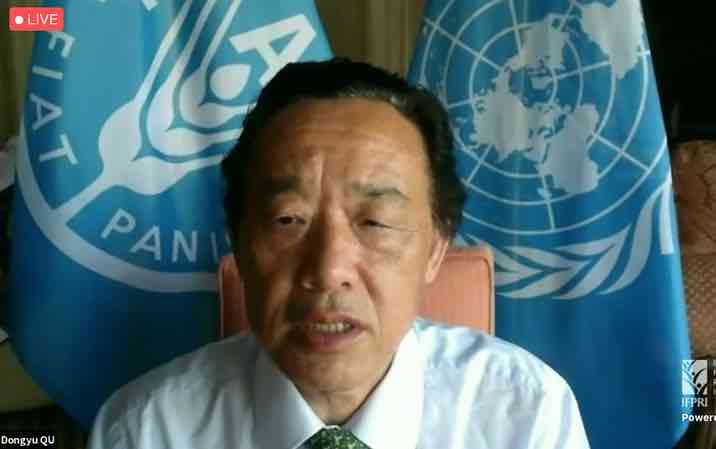Almost 690 million people went hungry around the world in 2019, an increase of 10 million over 2018, and the COVID-19 pandemic could push an additional 83 milllion-132 million into chronic hunger in 2020, according to the 2020 State of Food Security and Nutrition in the World (SOFI) report, released July 13. The report provides the latest authoritative estimates on global hunger, malnutrition, and food insecurity.
A July 14 virtual event, co-organized by the U.N. Food and Agriculture Organization (FAO) North America and IFPRI, examined the SOFI report’s key findings—and whether the goal of eradicating hunger by 2030 remains achievable in light of the pandemic. “We are not only not on track to eradicate hunger, food insecurity, and all forms of malnutrition by 2030, but also we need to redouble our efforts given the challenges brought about by COVID-19,” said FAO Director-General Qu Dongyu.
Hunger numbers have recently been trending upward since 2014, the report notes: 60 million more people around the world were chronically hungry in 2019 than five years before. Overall, the percentage of hungry people in the world population has remained relatively steady at 8.9%, even as absolute numbers rose.
“The report warns that if the trends in the past few years continue, we will be moving away from Zero Hunger rather than towards it. This is highly worrying,” said IFPRI Director General Johan Swinnen. “What’s even more worrying is … that COVID-19 is making matters much worse for the poorest people in the world,” he added, citing IFPRI’s estimates that the pandemic may put 100 million or more people at risk of extreme poverty and food insecurity.
“We need to take bold and decisive actions now if we are going to revert and mitigate the potential impacts that COVID-19 may have on hunger worldwide,” said U.S. Rep. Jim McGovern of Massachusetts, Co-Chair of the House Hunger Caucus. “We cannot afford to be isolationist, we cannot afford to be cheap, we cannot afford to be selfish,” McGovern added, calling for the United States to maintain and strengthen its global leadership in the fight against global hunger and malnutrition.
SOFI 2020 projects that 841.4 million people will be hungry globally by 2030 if these trends continue, and the world will not achieve its 2025 and 2030 targets of defeating malnutrition. FAO Chief Economist Máximo Torero, attributed these alarming findings to the unaffordability of healthy diets, noting that globally, 3 billion people lack the means and access to good nutrition. In order to transform food systems to reduce these costs, Torero said, policy makers must look at both supply and demand. Policies should enhance the efficiencies of the food supply chain and subsidize production of nutritious foods; at the same time, expanding social safety nets and policies that encourage behavioral change can promote healthier diets.
Even though the SOFI 2020 projections provide important estimates on the extent of hunger, food insecurity, and malnutrition around the world, Jeffrey Sachs—Director of the UN Sustainable Development Solutions Network and SDG Advocate for UN Secretary-General António Guterres—said he believes they are serious underestimates. “I think the evidence of this report makes clear that we need to report hunger and poverty fundamentally differently,” said Sachs. The international hunger line is not a good indicator of nutritional status (you can have a full stomach but suffer various forms of malnutrition), he said, while the international poverty line is not a sensible measure for an individual’s ability to meet basic needs to be healthy.
The 2020 SOFI report’s focus on the quality and affordability—not merely quantity—of the food supply is critical, said Marie Ruel, Director of IFPRI’s Poverty, Health, and Nutrition Division. That’s because a poor quality diet is the one shared driver of all forms of malnutrition.
Ruel outlined various measures that health systems, social protection systems, and agriculture and food systems can take to respond, with “the common goal of improving the affordability as a catalyst for joint action across those sectors and systems,” she said. Some measures include providing nutrition counseling, improving food quality for food transfers, and supporting local agricultural production.
“A major reason for the high cost of healthy diets is the lack of diversity—non-starchy staples cost more and also are less available,” said Anna Herforth, a Senior Research Associate at the Harvard Chan School of Public Health. Currently, she noted, the world does not produce enough nutritious food to provide everyone with all food types needed for a healthy diet. Policy makers should address both availability and affordability by investing more in legumes and vegetables and expanding social safety nets, she said.
“We should make the message clear that having access to healthy diets will mean that we can improve our health and get better opportunities,” said Anna Lartey, Director of FAO’s Food and Nutrition Division. Social protection programs are effective for making healthy diets more affordable, only in the short term, Lartey said, so it is critical to address structural problems such as unemployment, low wages, and the lack of women’s empowerment to prompt more long-lasting change.
Although the SOFI reports have been providing much-needed analysis in understanding global hunger and malnutrition, the world has not fully leveraged this information in the form of effective actions, policies, programs, and investment. “We need to build a new normal … which calls for deep political commitment, effective and honest governance, equitable economic growth, and adequate and timely investment towards delivering SDG2,” said FAO North America Director Vimlendra Sharan. “It is time for humanity to build a giant leap forward to eradicate hunger and malnutrition once and for all.”
Khiem Nguyen is an IFPRI Communications Intern.







